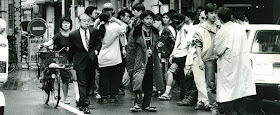Image and text borrowed from The Japan News, 1/30/14.
Not only are you being watched and recorded, your behavior is being analyzed as well. So much for the Personal Information Protection Law and privacy in public...
Countless cameras scanning pedestrians’ faces and tracking their behavior—it may sound like a science fiction movie, but this is to be a reality at JR Osaka Station come April.
The station, which serves 820,000 passengers per day, is scheduled to be the stage of an unusually large study on tracking location data using facial-recognition technology.
Although attempts to utilize location data as “big data,” such as in crime prevention, are expected to become more and more common, it remains to be seen how accepting people will be of their behavior being tracked.
The study is being conducted by the National Institute of Information and Communications Technology (NICT), an independent administrative institution based in Tokyo.
About 90 cameras are to be set up on the first to third floors of Osaka Station and the station building, Osaka Station City, around ticket gates, coin lockers, escalators, shops and other areas.
Each camera is to photograph people’s faces within a three-square-meter area, and assign each face an ID based on its characteristics.
When a person is recognized by another camera, the time and location will be recorded. Each person’s behavior will then be tracked for one week.
According to the firm supplying the facial-recognition system, the technology can distinguish an individual with an accuracy of 99.99 percent.
Each day, 820,000 passengers use Osaka Station, and at least 320 million people have entered the shops in the station building since it opened in May 2011, making it one of busiest places in the Kansai region.
An NICT official said the institute wants to better understand the movement of people to help improve evacuation instructions during disasters.
The study is slated to last for two years. Afterward, the data is to be given to West Japan Railway Co. free of charge, after facial images and other information has been scrubbed.
A JR official said the company has not decided how to use the data.
Facial images could be used to determine a person’s identity, which is a form of personal information that falls under the Personal Information Protection Law, which requires people to be notified if they are being photographed.
Independent administrative institutions, however, are exempt from this law. Still, NICT said it plans to notify people they are being photographed through signs inside the buildings and other means, but has not decided how large, where, or how many signs will be posted.
Facial-recognition technology was developed in the 1990s and has been employed to identify people at entrance gates for market research and for other uses.
Beginning around 2011, Facebook and other social media outlets began integrating the technology, but using it to follow people’s behavior with large numbers of cameras is unusual.
Yoichiro Itakura, a lawyer privy with privacy issues, said the location of the study in a busy public space was problematic.
“A station is a public area, so people who don’t want their faces identified can’t really avoid it,” he said. “It’s inappropriate to have selected a place for the study where users have no other choice. At the very least, they should put up a clear notification before one enters the study area.”
Wi-Fi also used
The wireless Internet capabilities of smartphones are also being used to analyze behavior.
Starting in May last year, KDDI Corp. and Mitsui & Co. began installing devices that emit Wi-Fi signals in commercial establishments.
The devices collect an identification number from customers’ smartphones via the devices’ wireless signals, and use these to track people’s movements.
Twenty-two such devices have been installed in Grandberry Mall in Machida, Tokyo, and 25 devices have been placed around Tamaplaza Terrace in Yokohama. Each device can apparently identify customers within 10 square meters.
The stores have a smartphone app that gives out coupons. When a customer downloads the app, the user contract explains that it “is used to survey location data.”
However, even customers who have not downloaded the app will have their ID numbers collected if their smartphone Wi-Fi is on, though most customers are unaware of this.
KDDI and other parties involved said if location information is obtained from a customer who has not downloaded the app, the data is not analyzed and discarded within six months.
However, a similar form of behavior analysis that took place in London came under heavy criticism and was forced to end.
Last August, an advertising company set out garbage cans fitted with Wi-Fi devices, according to Mayumi Tanimoto, a telecommunications consultant who lives in Britain.
The devices were used to collect ID numbers of the smartphones of passersby without their permission. When the practice was discovered, the company was criticized for privacy invasion and eventually had to remove the trash cans.
Source: http://the-japan-news.com/news/article/0000974145

























